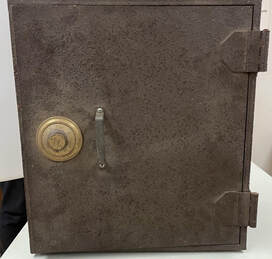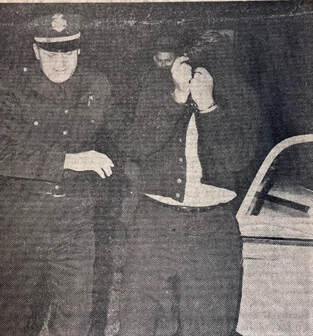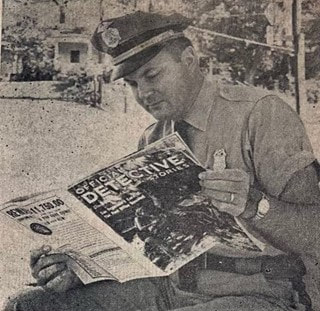This Month in Rockingham County History: January - 'McAnally Theft One of the Largest in NC History'1/24/2022 January 1963 (Above: The McAnally safe now in the MARC collections. The safe was stolen in January 1963 and recovered months later from High Rock Lake. Its contents were worth about $130,000. Photo by J. Bullins.) (Above: The McAnally safe now in the MARC collections. The safe was stolen in January 1963 and recovered months later from High Rock Lake. Its contents were worth about $130,000. Photo by J. Bullins.) On a chilly January afternoon in 1963, a safe full of cash, stocks, and bonds was stolen in broad daylight from the home of Madison dentist Dr. C. W. McAnally. It was believed to be the largest theft in the state of North Carolina up to that time. When the thieves opened the safe at a cabin near High Rock Lake in Davidson County, even they were surprised by the remarkable amount inside—about $130,000 in all. The victim and law enforcement, led by Madison Police Chief Paul Case and officers from the State Bureau of Investigation (SBI), pieced together the details of the robbery. On January 17, Dr. McAnally had walked from his upstairs dental office on Murphy Street back to his home for lunch around 11:40. After his midday meal, McAnally testified, he sat for a while and looked out his window, where he noticed someone behind a tree in the yard, where the man (later identified as one of the thieves) stood for about fifteen minutes. McAnally then saw that man walk across the street and speak to another who was waiting at the car dealership there. Just before one o’clock, the dentist locked the front door, put the key where it was usually left in a hanging wicker basket on the right side of the door, and walked back down Market Street the block and a half to his office. When McAnally returned home around five, he found the front door unlocked and the key and basket on the floor just inside the entryway. He checked the back door and found it was also unlocked. He then realized that his safe had probably been taken and went to the closet where it had been hidden. The 150-pound metal safe, where McAnally had placed the cash and important financial documents decades earlier, was, in fact, gone. Three men were eventually arrested, tried, and convicted of the crime. Two—Joseph Thomas Watkins, 35, and Howard Eugene Knight, 32, who had entered the home and stolen the safe—were arrested only four days after the robbery. The third, Henry Lewis Leonard, 32, of Lexington, was not arrested until April. In February, McAnally thanked the Madison Police Department for their quick action leading to the arrest of Watkins and Knight by giving the department a check for a needed piece of equipment—a $600 two-way walkie-talkie—that would help them patrol the town.  (Above: Suspected thief Howard Eugene Knight covers his head as he is taken into the jail in Wentworth by Madison Police Chief Paul Case. Photo from The Messenger (Madison, NC), January 24, 1963, 1.) (Above: Suspected thief Howard Eugene Knight covers his head as he is taken into the jail in Wentworth by Madison Police Chief Paul Case. Photo from The Messenger (Madison, NC), January 24, 1963, 1.) The theft unfolded this way: News had circulated in the area and eventually among the criminal crowd that McAnally kept a large amount of cash in his home. The trio of thieves, who had served time in and become well acquainted with NC jails over the previous decade, may have heard that one area resident had had a large insurance check of $1800 cashed by the dentist in his home after hours. Leonard suggested the dentist as a target to Knight and Watkins and drove the get-away car, a blue and green Mercury they had borrowed from an acquaintance in Greensboro. Two local men later told authorities that they had seen this car parked beside the McAnally house. On the afternoon of January 17, 1963, the two robbers entered the dentist’s home with the key and found the safe in the closet. Watkins was able to lift the heavy safe and carry it out the back side door. They put the safe in the back seat of the car and Watkins sat there beside it. Next, the thieves stopped at a hardware store in High Point, where Watkins bought a screwdriver and a crowbar. He had learned to crack open safes while on the lam after a prison escape in the mid-1950s and boasted later that he had the McAnally safe open in less than ten minutes. The robbers then took the stolen safe to a cabin owned by Leonard’s father at High Rock Lake. “It was full of money, most money I'd ever seen in my life,” Watkins later told a reporter. “I was really surprised. All of us were.” There were so many bills that they had to use two bunk beds at the cabin to stack and examine their haul— hundreds, fifties, twenties, and a few smaller bills. As the prosecution later described the cash for judge and jury, “This money, by reason of being kept for years in his safe, had a moldy, stinky odor.” Several witnesses testified that bills given to them by the defendants also had this very identifiable “moldy” smell. In the days immediately following the heist, the trio of thieves traveled to Greensboro, Salisbury, and Fayetteville and had dealings with many people across the state, including family members, gambling pals, and military police. They had a female acquaintance return the vehicle they had used during the theft to the home of its owner in Greensboro and both Watkins and Knight bought cars. Knight paid a dealer, the father of Henry Lewis Leonard, $2100 for a 1961 Chevrolet on January 18, and the teller who received this deposit later testified that the bills had a “foul” odor. On the morning of January 19, military police stopped Watkins as he was “weaving” on a highway near Fort Bragg and charged him with drunk driving. Watkins paid the $300 bail with fifteen twenty-dollar bills from his stash. Officials later testified that there was a “distinct odor of mustiness, an unpleasant odor to the money.” Watkins was arrested at the home of his sister in Greensboro, but only after a surprising mix-up. The day after the robbery, he had left some cash (about $300) and a suitcase full of what he thought was dirty clothing at her home. When the sister opened the case, she found a pillowcase filled with what turned out to be about $15,000 in very “moldy” smelling bills. The money smelled so bad, she told authorities, that she sprayed the room with an air deodorizer. She called her husband and her father and upon showing them the contents of the suitcase, they called the police. Meanwhile, Watkins had realized his mistake while gambling in Fayetteville when he went to the car to get more cash, finding instead his dirty laundry. When he arrived at his sister’s home to retrieve the suitcase, he was met with a “double-barreled shotgun” and law enforcement officers who arrested him. Watkins told the SBI that he had won the money gambling. Somewhere around $17,000 of the large cash haul was eventually recovered, mostly from Watkins’ share of the money. It is not clear what happened to the rest. Knight was later apprehended by police in Charlotte and brought back to Rockingham County, where he and Watkins were initially held on bonds of $150,000 each. At the trial in Wentworth in June, McAnally was asked to identify the recovered bills as those he had stored in the safe in his Madison home some twenty-five to thirty years earlier. Although he could not confirm the bills were his from serial numbers or markings, he testified that he could do so another way—by their distinctive odor. To challenge him, the defense attorney took two bills out of his own wallet, mixed them in with others recovered from the accused thieves, and shuffled the stack. The dentist “closed his eyes and sniffed each bill separately,” saying “yes” to each of the recovered bills and “no” to the attorney’s money. The jury also “smelled” the money entered as evidence. The judge at the trial in the Rockingham County Courthouse (now the MARC building) explained to the jury the role of circumstantial evidence, as some of the details in the McAnally case fell into this area of the law. After deliberating only thirty minutes, the jury convicted Knight and Watkins of breaking and entering and larceny and sentenced them each to fifteen years in prison. Their accomplice Leonard would later receive the same outcome and sentence when he stood trial. Defense attorneys appealed the convictions to the North Carolina Supreme Court, which held that no errors had occurred that would warrant a new trial. Details of the heist as presented in court were confirmed and additional information was given in an interview of one of the accused with a Greensboro reporter in the early 1990s.  (Above: Police Chief Paul Case examines the story about the McAnally safe theft in the August 1963 issue of Official Detective Stories. Case disputed many of the "facts" presented in the article titled "Sleuthing Behind Prison Walls." The Messenger (Madison, NC), July 4, 1963, 1.) (Above: Police Chief Paul Case examines the story about the McAnally safe theft in the August 1963 issue of Official Detective Stories. Case disputed many of the "facts" presented in the article titled "Sleuthing Behind Prison Walls." The Messenger (Madison, NC), July 4, 1963, 1.) The case fascinated the public. Much of the evidence was a bit unusual—the surprisingly large amount of money kept at home rather than in a bank, the robbery carried out in broad daylight on a downtown street, the “mixed-up” suitcases (one filled with money, the other with dirty clothes), and, most of all, the references by multiple witnesses to the foul, pungent odor of the bills. The case was even written up in a true-crime magazine. The article in the August 1963 issue of Official Detective Stories, however, went too far in embellishing details about the robbery, according to the police chief who headed the investigation. Paul Case saw the article as "90% wrong,” he told local reporters. The only parts the detective magazine writers got right were “my name, Dr. McAnally’s name, and the name of the town,” he said. At the time of the robbery, Dr. McAnally was in his late 60s and had practiced dentistry in Madison for forty years. He died in 1974, leaving an estate valued at about a million dollars. Prior to the 1963 McAnally robbery in Madison, the largest theft in North Carolina was likely in the early 1930s in downtown Charlotte, when a gang took $100,000 from a mail truck. The offices of the Dodson Shelton Nelson accounting firm now occupy the McAnally house and artifacts related to the heist are now in the MARC collections. These include the metal safe, which was recovered from High Rock Lake in about thirty feet of water and given to the museum by McAnally’s daughter, Lib McAnally Folger Apple. References:
Articles from The Messenger (Madison, NC): “McAnally Robbery May Be Biggest In State’s History,” January 24, 1963, 1, 3; “Bond Reduced on Pair Held in Robbery,” January 31, 1963, 1; “Dr. McAnally Makes Gift to Town,” February 7, 1963, 1; “McAnally Testifies in Robbery Hearing,” February 14, 1963, 1; “Man Woman Jailed in McAnally Heist,” April 25, 1963,1; “Two Men Standing Trial in McAnally Safe Theft January 17,” June 13, 1963, 1,2; “Two Convicted As Safe Robbery Case Ends at Wentworth,” June 20, 1963, 1; “Chief Says Magazine Account Inaccurate,” July 4, 1963, 1; STATE v. GENE KNIGHT AND JOE WATKINS, North Carolina Supreme Court, Opinion, 261 N.C. 17, 134 S.E.2d 101 (1964), https://casetext.com/case/state-v-knight-150; Meredith Barkley, “Big Heist: Record Robbery Was Pulled on Madison Dentist,” Greensboro News and Record, August 3, 1993, https://greensboro.com/big-heist-record-robbery-was-pulled-on-madison-dentist/article_e23208af-d85b-5be8-a831-040bea957485.html; Myla Barnhardt, Madison’s Biggest Heist, February 12, 2013, Greensboro News and Record, https://greensboro.com/news/local_news/madison-s-big-heist/article_92bf65ae-a583-5ff8-a4fc-68d4bc75a014.html; Hayley Fowler, “Gangster Rivaling Al Capone Arranged Infamous Charlotte Heist on This Day 88 Years Ago,” November 15, 2021, Charlotte Observer, https://www.charlotteobserver.com/news/state/north-carolina/article255834081.html.
1 Comment
Boyd Bennett
3/1/2022 10:20:24 am
Great article. Thanks
Reply
Leave a Reply. |
Articles
All
AuthorsMr. History Author: Bob Carter, County Historian |
|
Rockingham County Historical Society Museum & Archives
1086 NC Hwy 65, Reidsville, NC 27320 P.O. Box 84, Wentworth, NC 27375 [email protected] 336-634-4949 |
 RSS Feed
RSS Feed
